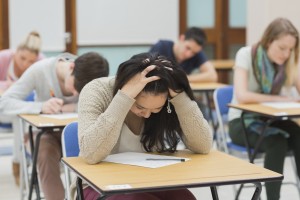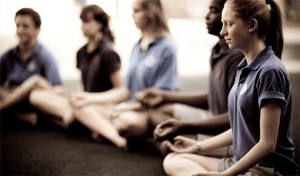Mindfulness: A Program to Combat Test Stress
At Boca Raton Community High School (BRCHS), students take over 14,000 standardized tests annually. There are myriad reasons for students to be taking standardized tests. This includes testing requirements to earn a Florida high school diploma such as the Florida Standards Assessment for English Language Arts (FSA ELA) and the Algebra I, US History, Geometry, and Biology end-of-course exams (EOC). In addition, BRCHS offers a wide variety of Advanced Placement (AP) courses through the College Board, Advanced International Certificate of Education (AICE) through the University of Cambridge, as well as industry certification exams such as electrocardiograph technician (EKG) and ServSafe certification to help give students the opportunity to earn meaningful employment upon graduation if the student is headed straight to the workforce.

This wide variety of rigorous coursework available to students led The Washington Post to rank BRCHS the 24th most challenging high school in the United States of America (“America’s Most Challenging High Schools Top 25 National List,” 2017). The internationally recognized programs that are offered to students lead to them earning acceptances to some of the most outstanding colleges in the country, but, it also creates pressure for students as the academic demands of collegiate-level courses (ex. AP and AICE) are higher than comparable honors-level courses.
In this environment, students can sometimes find themselves stressed and looking for ways to decompress. BRCHS offers students the option to take Yoga as a course on their schedule. Since the course is a regular-level credit, it can actually harm a student’s Honors Grade Point Average (HPA) which determines a student’s class rank. This means that in many cases, students taking the most challenging courses so as to keep their HPA/class rank high opt not to take the course and thus lose out on the opportunity to take time out of their day to help center themselves and get some exercise. In addition, every student who earns the AICE Diploma is exempted from the physical education requirement.
With such a challenging academic culture, BRCHS students could benefit from a non-credit-bearing after-school program developed and implemented based on the concept of mindfulness, defined as being aware of the moment in which you are experiencing through using techniques such as meditation (Burke & Hawkins, 2012). This program would be designed to have different mindfulness techniques and exercises each week for students to participate in if they so choose. This program would be open to any and all students who wish to participate with BRCHS covering the cost of the instructor who would be a teacher on staff working for outside-the-classroom pay.

A recent study showed that mindfulness can help students reduce stress and mind wandering while taking the Graduate Record Exam (Mrazek, Franklin, Phillips, Baird, & Schooler, 2013). Given the results of this study and the number of tests that students take at BRCHS, it stands to reason that students could benefit from having the chance to take dedicated time to help improve their mental and physical wellness with the guidance of a trained instructor. It could go a long way towards helping the students disconnect from their stress and re-connect with the strength and resilience that they have inside of them.
References
America’s Most Challenging High Schools Top 25 National List. (2017). The Washington
Post. Retrieved from https://www.washingtonpost.com/local/education/americas-most-challenging-high-schools-top-25-national-list/2017/06/25/a92e2c50-578e-11e7-ba90-f5875b7d1876_story.html?utm_term=.262d331f76a0
Burke, A., & Hawkins, K. (2012). Mindfulness in education: Wellness from the inside out. Encounter: Education for Meaning and Social Justice, 25(4), 36–40.
Mrazek, M. D., Franklin, M. S., Phillips, D. T., Baird, B., & Schooler, J. W. (2013). Mindfulness Training Improves Working Memory Capacity and GRE Performance While Reducing Mind Wandering. Psychological Science, 24(5), 776–781. https://doi.org/10.1177/0956797612459659
Josh, as you already know, I could not agree with you more on this!!! Yoga is an ancient practice, rooting back to over 5000 years ago. It just recently has become popular in the Western world and it is one of the fastest growing industries in America today; In 2016, 36 million Americans practiced yoga which was up from 20.4 million in 2012 (Wei, 2016). As an instructor myself, I think the practice is so important for teenagers as it is the perfect way to combine the mental exercises (mindfulness) along with the physical which is clearly lacking for adolescents today.
Recent education reform efforts along with various social trends have caused students to experience stress levels higher than ever before (Jayson, 2014). Students are not only stressed and anxious when it comes to taking tests; they are stressed about getting into higher level courses, getting admitted into elite colleges, meeting parent/coaches/teachers’ expectations, and much more. In addition, the excessive use of technology has significantly contributed to higher levels of social anxiety, physical inactivity, depression rates and other mental health issues. In essence, these changes have caused students to focus on past and future events more. It has taken them away from living in the present moment and enjoying each part of life’s journey. Hence, there is all the more need for mindfulness programs in the lives of 21st century teenagers.
References
Jayson, S. (2014, February 11). Teens feeling stressed, and many not managing it well. Retrieved March 06, 2017, from http://www.usatoday.com/story/news/nation/2014/02/11/stress-teens-psychological/5266739/
Wei , M., MD . (2016, June 15). New survey reveals the rapid rise of yoga – and why some people still haven’t tried it. Retrieved September 27, 2017, from https://www.health.harvard.edu/blog/new-survey-reveals-the-rapid-rise-of-yoga-and-why-some-people-still-havent-tried-it-201603079179
Josh, what insightful comments and research in your blog… so refreshing to read such open”mind”edness about mindfulness!
I found your point very spot on about why students are opting out of taking the yoga course because it would hurt their GPA… and what a shame students are overwhelmed by college admission/grade pressure and miss such beneficial opportunities that lead to life long health and wellness practices. Ultimately, this is what they need to help balance and succeed in academics and other extra curricular activities.
I believe this could be utilized in lower schools, high schools, and college. I’m interested to hear your thoughts on the benefits for administrators, teachers, and parents?!
Greetings Josh,
It was refreshing to read your post and know that you are highlighting mindfulness practices and its importance to young adults. Far too often ,we as educators spend lots of efforts into managing what we believe to be best for a student’s academic career. Though done with good intentions, I think rarely do educators reflect on how the student is managing the stress of performing at such rigorous levels. Bringing about the awareness of how mindfulness can play an essential role in a student’s academic experiences is very much one that needs to be strongly considered by educators. I believe that mindful practices among educators can increase if they are provided with guidance on how to implement these strategies along with daily content instruction. Once educators experience that they are able to incorporate mindfulness tools and still deliver rigorous lessons , their mindsets are likely to change and so will the culture of what teaching looks like for our students. Awesome insight. Thanks for sharing.
-Cortney R.
Hey Josh, glad to hear that BRCHS offers opportunities for students to learn how to manage stress. In our high-stakes system, it is no doubt students become overwhelmed by all the pressure. Like Katie, I agree there must be “balance” in students lives and I fully support schools working harder to promote that practice. Some of the most beneficial courses I had as a young adult were “non academic”. As a side note, non-academic courses are not necessarily easier or less meaningful.
I am interested to see how BRCHS addresses this issue. I think a non-credit-bearing after-school program would be a great start. Students should certainly not be “punished” for taking non-academic classes here and there. To bring up a point from another post, colleges also look for well-rounded students. Academics should take precedent, however, it should not be at the expense of students’ well-being.
Joshua,
You know my “mind” in regards to “mindfulness” as this is a topic that I am entirely passionate about as an Educator.
Your insight in regards to tests, the demands on students and options moving forward towards these demands are interesting — all of which I have also come across in my research; it is within the last line of your blog which truly enlightened me: “it could go a long way towards helping the students disconnect from their stress and re-connect with the strength and resilience that they have inside of them.” For students to “disconnect” and “re-connet” — turning “inward” back to their strengths and resilience is key to academic achievement.
Working in Higher Education for 8 years, I have seen an extraordinary increase in stress, anxieties and loss of “connection” among our students, which is interesting — being we are educating the more “connected” students we have ever faced.
Your blog “speaks” volumes in regards to what is needed moving forward for our students — bringing our students back to themselves and being “mindful” in just that.
Excellent Josh.